© HEAL Network for the Ethnography of Healing
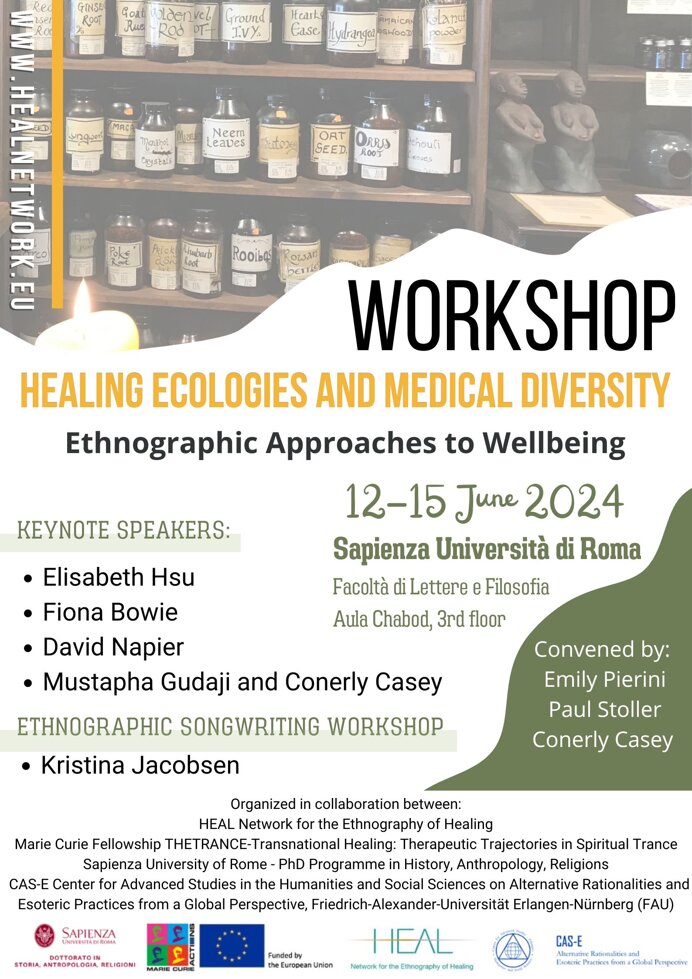
Workshop participants and online audience can register for free here:
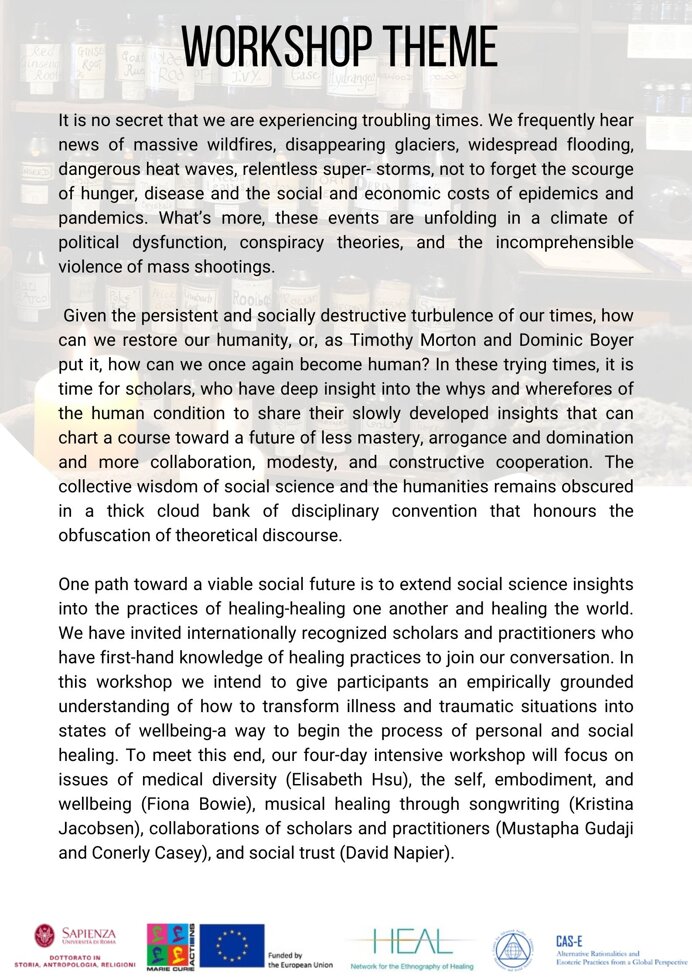
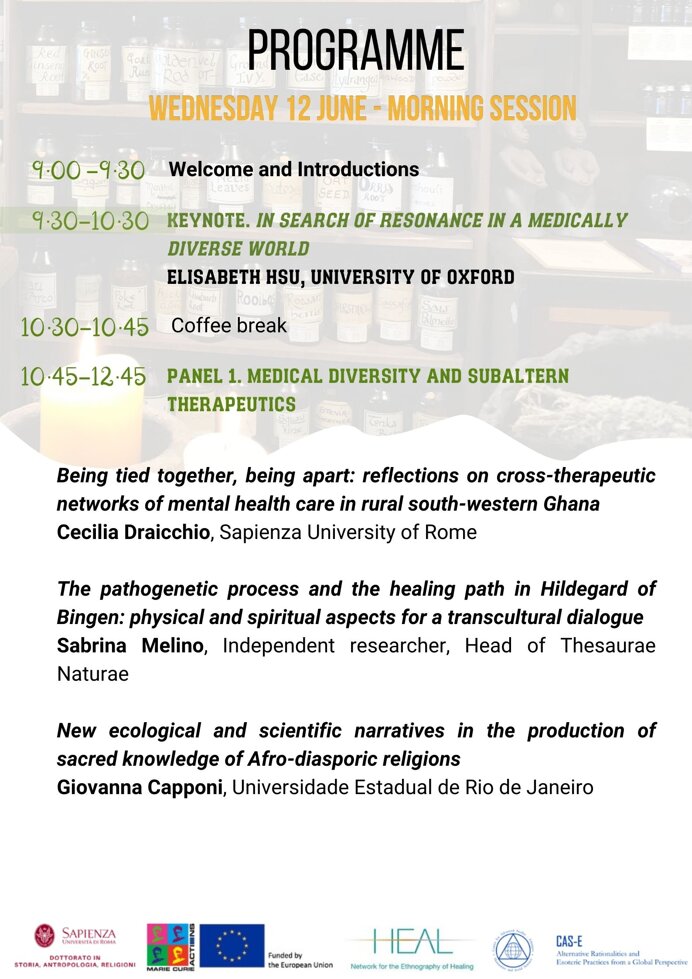
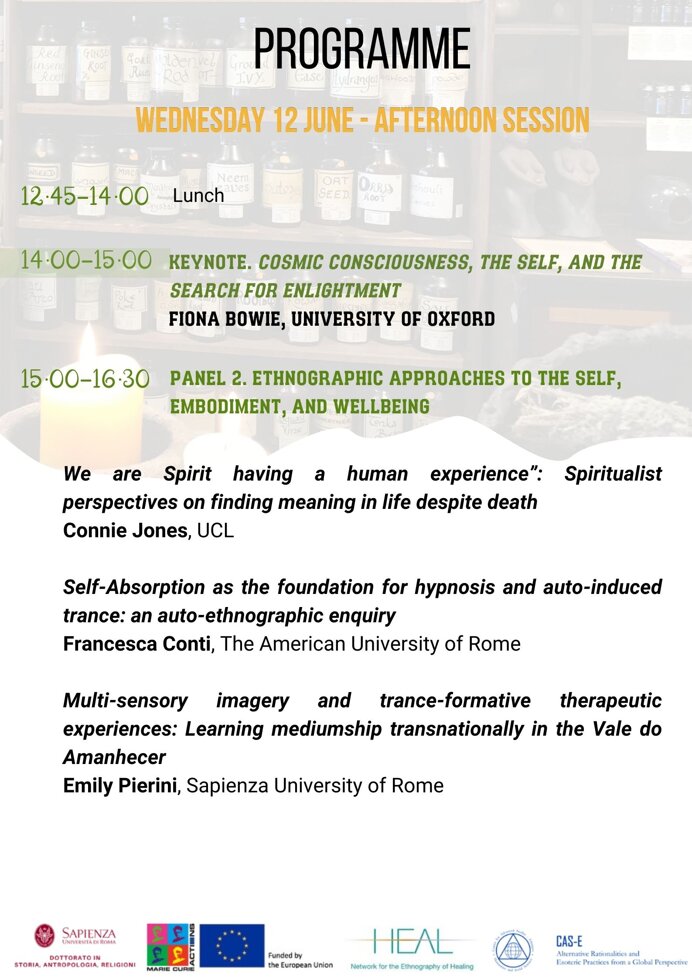
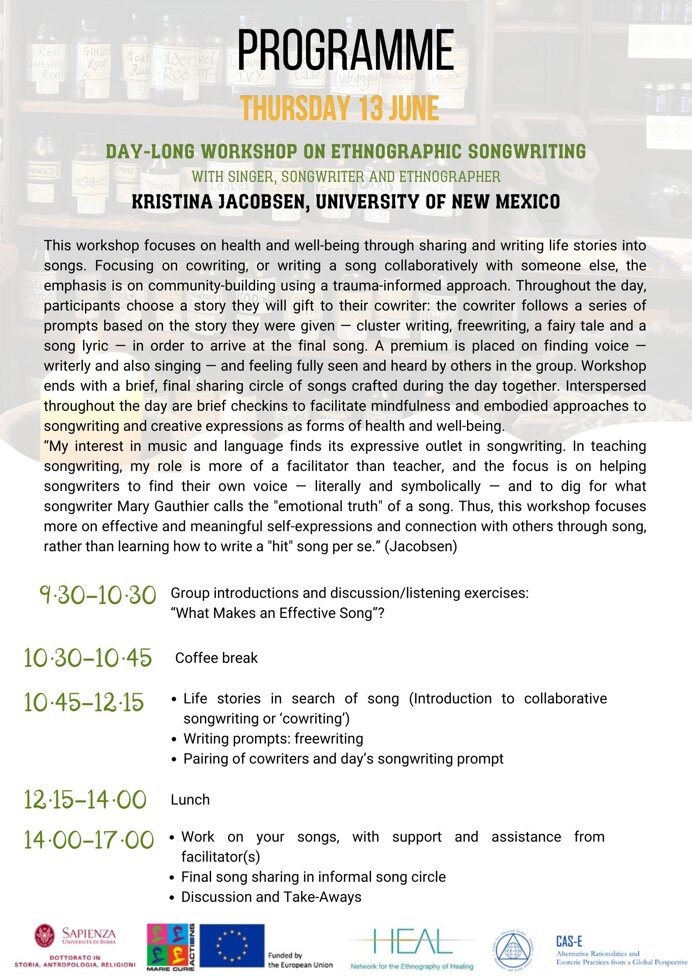
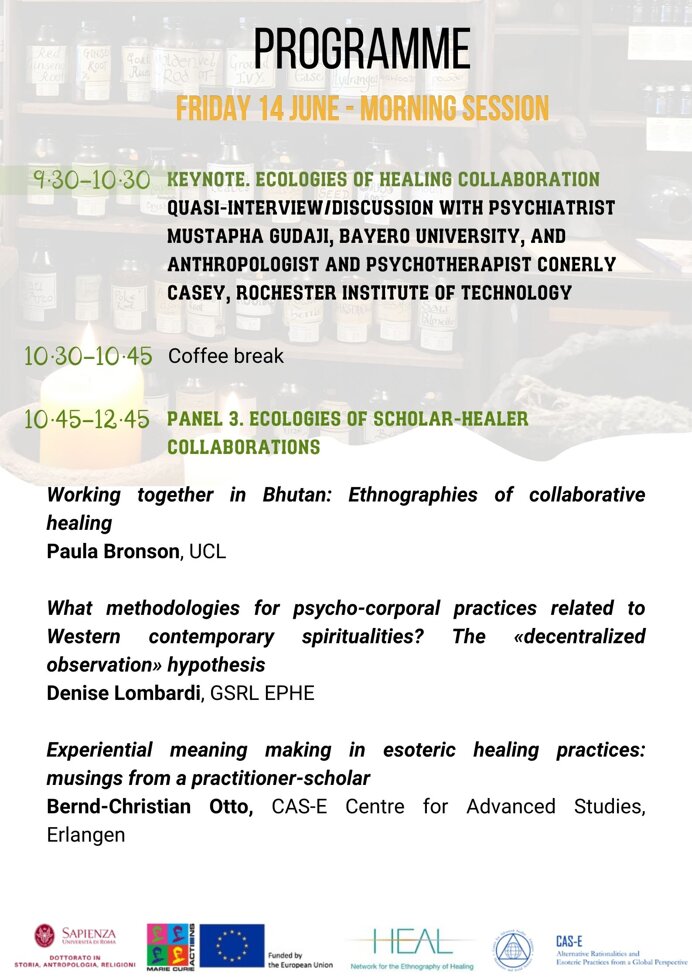
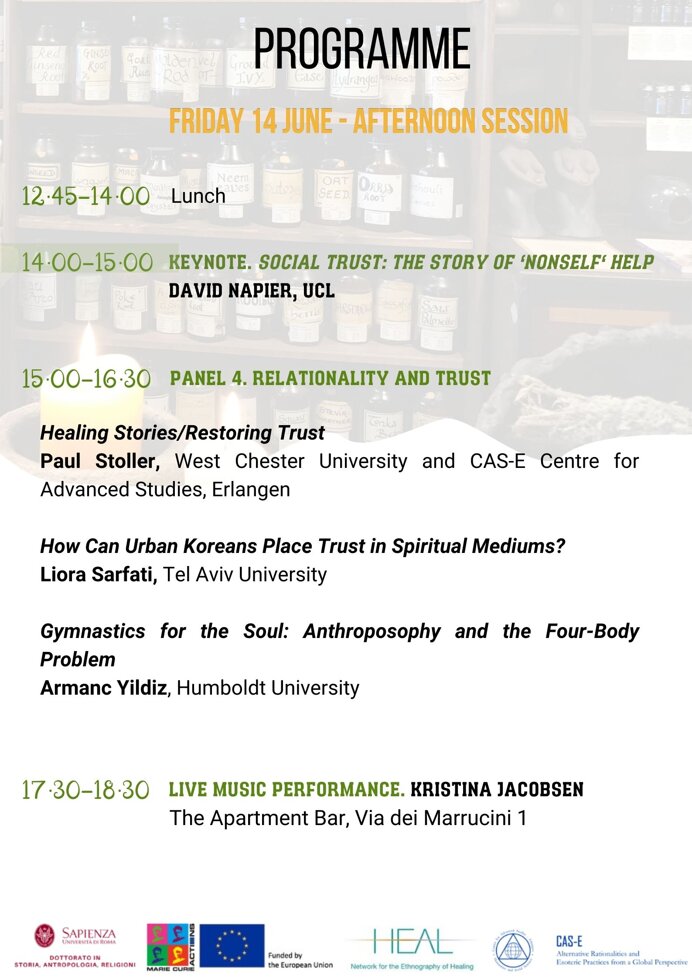
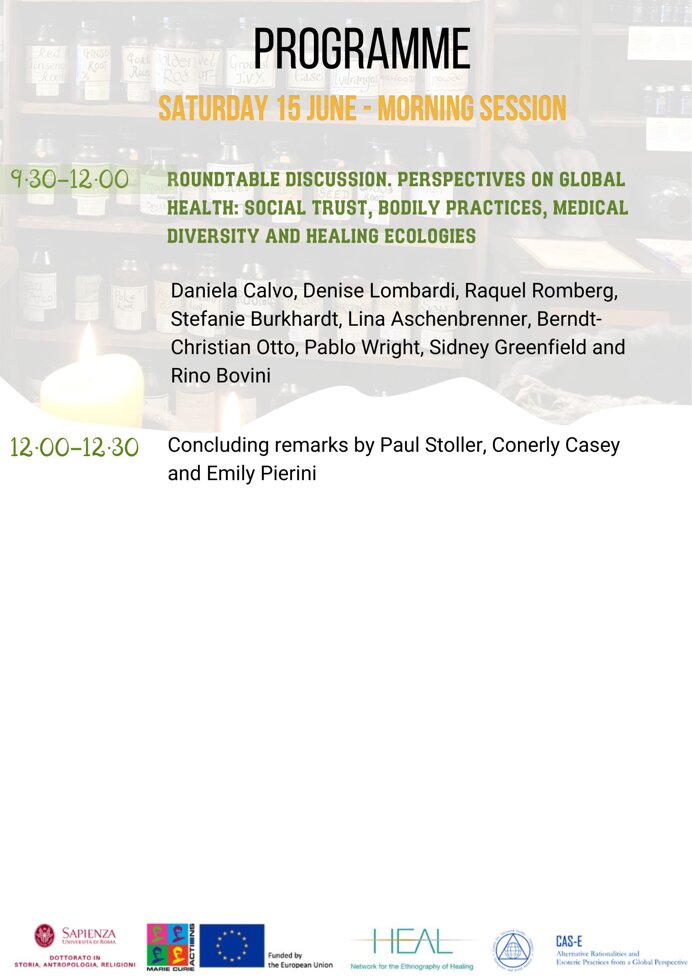
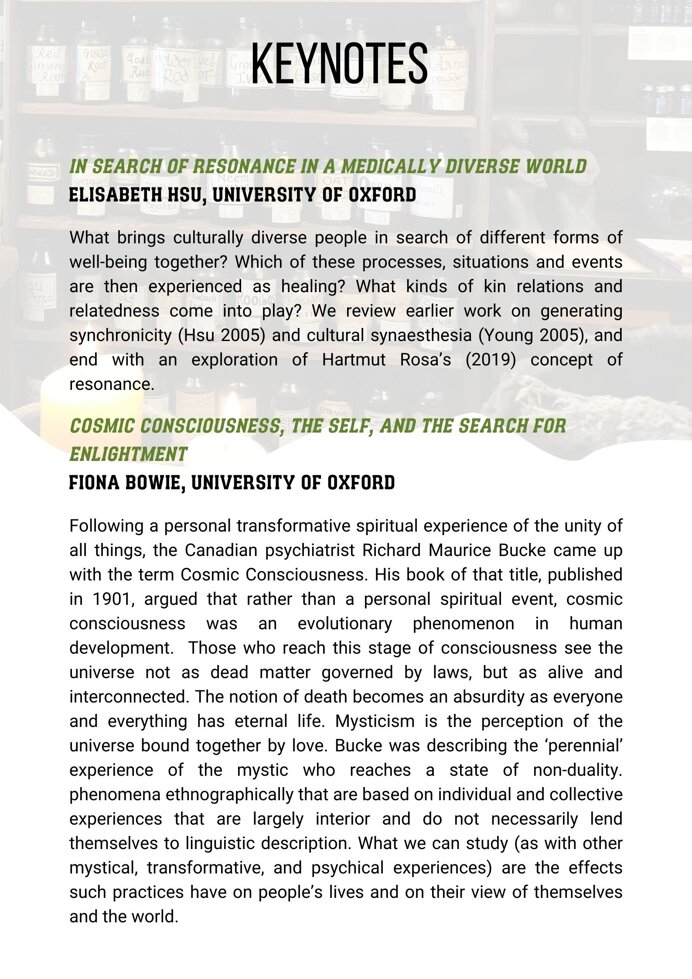
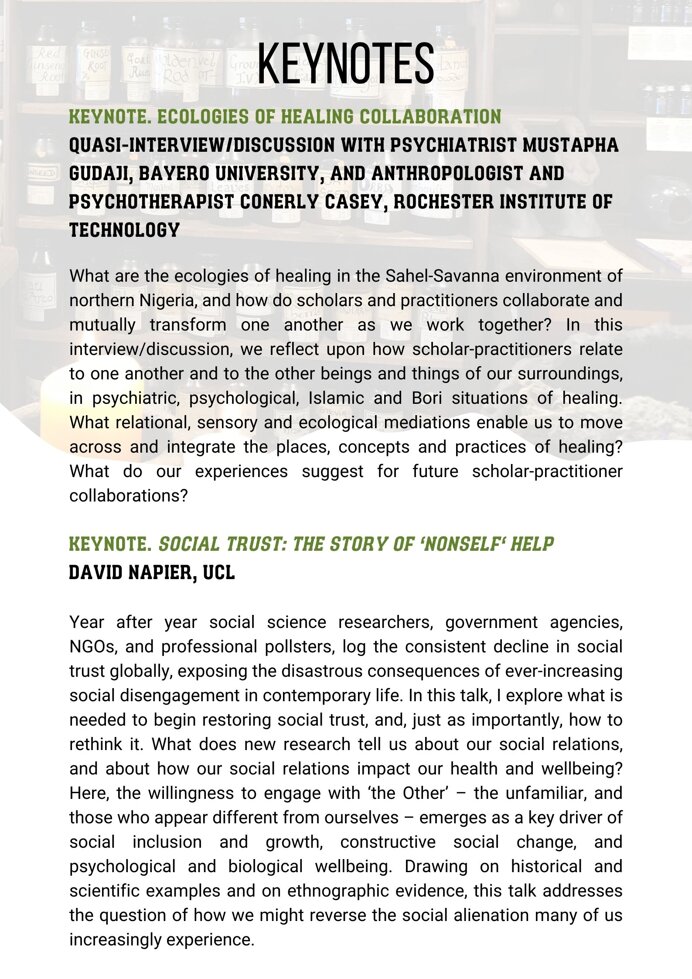

How to get there
Workshop venue: Sapienza University of Rome
Facoltà di Lettere e Filosofia (Edificio CU003 - Map)
Dipartimento di Storia Antropologia Religioni Arte Spettacolo (SARAS)
Piazzale Aldo Moro 5, 00185 Rome, Italy
Workshop room: Aula Chabod, 3rd floor of the Faculty of Humanities (Facoltà di Lettere, edificio CU003), considering that the 1st floor is the main entrance to the faculty building.
The Campus is located at a 15 min. walking distance from Termini Train Station.
From Fiumicino Airport: there is a direct train (Leonardo) from the airport terminal to Termini Train Station. Tickets can be booked online.
From Ciampino Airport: SIT bus and Terravision busses link the airport to Termini Train Station: https://www.adr.it/web/aeroporti-di-roma-en/pax-cia-bus
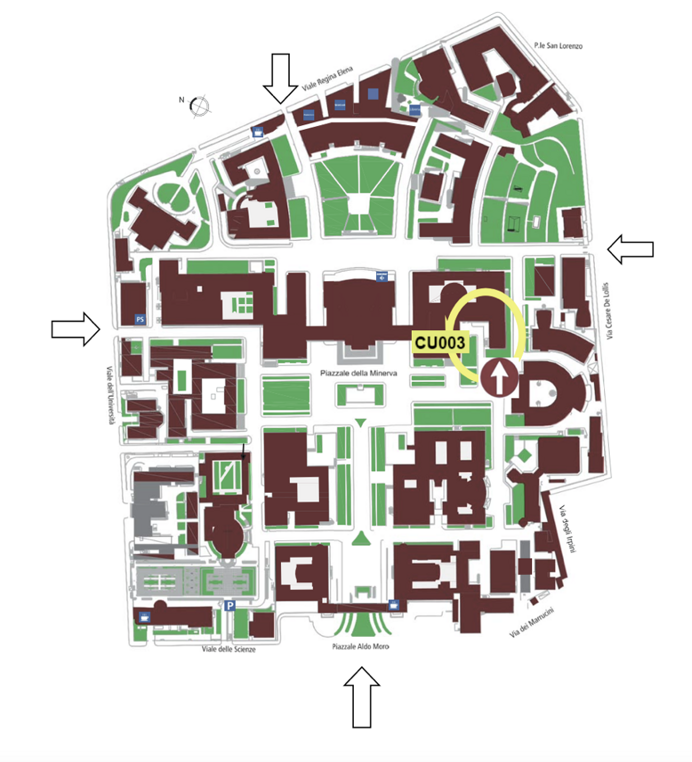
Biographical notes
Dr Fiona Bowie is a Research Affiliate in the School of Anthropology and Museum Ethnography at Oxford University and a Member of Wolfson College, Oxford. She has a BA in Anthropology from the University of Durham and a DPhil in Social Anthropology from the University of Oxford. She conducted her original fieldwork in Cameroon, West Africa, looking at the relationship between missionaries (particularly the Focolare Movement) and the Bangwa people of SW Cameroon. She has continued to keep contact with both the Focolare and the Bangwa, both within and outside Cameroon, over a period of more than forty years, addressing mission history and ethnography, gender, notions of witchcraft and cosmology, kinship, spirituality, and new religious movements. A second period of fieldwork in North Wales, while teaching at the universities of Bangor and Lampeter, led to publications on Welsh language and identity, pilgrimage, and religion in Wales. After moving to Bristol University, Fiona Bowie developed an interest cross-cultural and particularly Western notions of death and the afterlife. This led to the development of the Afterlife Research Centre as a network for those attempting to develop an ethnography of the afterlife and related phenomena using data that includes mediumistic, shamanistic, and telepathic sources, as well at out of body experiences, near death experiences, and mystical experience. The notion of apprenticeship and participation is encouraged where appropriate as a method of gaining a greater understanding of these phenomena. Fiona Bowie’s recent research and publications touch on mediumship, spirit possession and spirit release, forms of meditation and angelic healing. Inspired by Edith Turner, Fiona Bowie has taken up the challenge of incorporating these various forms of human experience into our ethnographic data with the aim of reaching a more wholistic notion of what it means to be human.
Dr Conerly Casey is Associate Professor in the Department of Sociology and Anthropology at the Rochester Institute of Technology (RIT). She holds a PhD in Anthropology (UCLA), with specializations in psychocultural and medical anthropology, and an MSEd in Counseling Psychology (USC). Prior to her degree in anthropology, Casey worked as a Crisis Clinician in the Emergency Departments of the University of Vermont Medical Center and South Shore Mental Health Center. She directed multiple programs for Addiction Services at Boston City Hospital, including the first acupuncture program. With Consultant Psychiatrists at the Aminu Kano Teaching Hospital in Kano, Nigeria, Casey developed a “Culture and Medicine” program for resident doctors, while teaching medical students at Bayero University. Her research interests include medical and psychocultural diversity, sensory studies, globalization and comparative religion, global health and the environment. Extensive archival and ethnographic fieldwork in the predominately Muslim region of northern Nigeria (1991-2017) and in Kuwait (2006-2009) has enabled Casey to contribute vital perspectives on Bori and Islamic healing and divining; spirit possession, witchcraft affliction, evil eye and evil words; relationality, and the well-being of Sahelian ecologies; trauma and the politics of health and state in northern Nigeria.
Dr Mustapha Gudaji is a Consultant Psychiatrist with the Aminu Kano Teaching Hospital in Kano, Nigeria, and a Senior Lecturer in the Department of Psychiatry, College of Health Sciences, Faculty of Clinical Sciences at Bayero University. He is an examiner with the National Postgraduate Medical College of Nigeria, responsible for training psychiatrists in the country, and has trained a number of consultants in the ‘almajirai’ system over the past six to seven years. Dr Gudaji is also a clinical psychopharmacologist with an MSc in pharmacology and currently involved in a PhD programme with a special interest in Neurodegenerative disorders with ethnobotanical native plants. He is a faculty in the African center of Excellence for Population Advocacy and Policy (ACEPHAP) in the College of Health Sciences, Bayero University, Kano, and took courses on “Policy Briefs” with the University of Washington e-learning in Global Health under the ACEPHAP center. As a resident doctor, Dr Gudaji participated in the Culture and Medicine program at Bayero University, and the development of the community-based Kumbotso Comprehensive clinic, working closely with people who had epilepsy. He also worked in the Bayero University Student Health Counseling Clinic. Dr Gudaji’s research interests include neurodegenerative disorders and plant-based medicines; HIV/AIDs and depression; the quality of life among patients with schizophrenia and other major mental illnesses; differential diagnoses in presentations of catatonia; sociocultural demographics associated with psychoactive substance use; and trauma after the Boko Haram insurgency in Nigeria.
Dr Elisabeth Hsu is Professor of Anthropology at the University of Oxford. In 2001 she joined the Institute of Social and Cultural Anthropology of the University of Oxford as University Lecturer in Medical Anthropology in order to set up the Medical Anthropology Master’s of Science and Master’s of Philosophy courses. In 2005, she co-founded the ongoing Berghahn book series on “Epistemologies of Healing”, specifically to increase the reach of doctoral-research-based monographs. In 2006, she co-established the ongoing “Anthropology Research Group at Oxford on Eastern Medicines and Religions”, Argo-EMR, for post-doctoral researchers interested in medical anthropological approaches to ‘traditional medicines’ and scholarly medical traditions. Elisabeth Hsu's research interests concern Chinese medical practice and textual learning; body and personhood; treatment modalities and their efficaciousness; pulse diagnosis and esp. tactile sensory experiences, feelings and affect, cognition and emotions. Her latest ethnographic monograph is Chinese Medicine in East Africa: an Intimacy with Strangers (Berghahn, 2022).
Dr Kristina Jacobsen (she/her/lei/bi) is an ethnographer, singer-songwriter, and cultural anthropologist. Her research focuses on language reclamation, expressive culture, popular music, and arts-based research methodologies. Her first book, The Sound of Navajo Country: Music, Language and Diné Belonging (UNC Press, 2017), is based on 2½ years of singing and playing lapsteel guitar with Navajo (Diné) country western bands on the Navajo Nation and was the winner of the 2018 IASPM-US Woody Guthrie Award for most outstanding book on popular music. A Fulbright Scholar, Jacobsen’s second musical ethnography, Sing Me Back Home: Ethnographic Songwriting and Sardinian Language Politics will be published simultaneously in Italian (Nota Press 2024) and in English (University of Toronto Press 2024), and focuses on ethnographic songwriting as a research methodology. While in Sardinia, she also recorded an album (her fourth) of original songs collaboratively written with Sardinian songwriters and language activists, House on Swallow Street with the Sardinian Label, Talk About Records. Her third book, The Creative Ethnographer’s Notebook, co-edited with ethnographic poet Melisa Cahnmann-Taylor (Routledge, 2024), is a craftbook that seeks to integrate ethnography and the arts in anthropology classrooms and for creative ethnographers from all paths. The Cultural Anthropology Advisor to the WOMAD South Africa Music Festival (23021-2023), Jacobsen founded and facilitates three culturally immersive songwriting retreats: in Sardinia, Italy, and along the historic Camino de Santiago pilgrimage route in northern Spain. Jacobsen is an Associate Professor of Ethnomusicology and Anthropology at the University of New Mexico. A touring singer-songwriter, she fronts the feminist honky-tonk band The Merlettes, and leads the Songwriting program at UNM.
Dr David Napier is Professor of Medical Anthropology at University College London and Director of its Science, Medicine, and Society Network. He has authored several books and articles on health resilience, vulnerability, indigenous healing and health agency, and co-authored three Lancet commissions (Climate Change and Health, Stem Cells and Regenerative Medicine, and Culture and Health, this last for which he served as lead author). He has written widely on the anthropology of religion, indigenous cosmologies, and ritual studies, including Making Things Better: A Workbook on Ritual, Cultural Values, and Environmental Behavior. Napier also specializes in health vulnerability, developing health assessment strategies and policy protocols in more than thirty countries for the UN, the WHO, and the European Commission, among others. He serves as Global Academic Lead for Cities Changing Diabetes (now in more than 40 cities), and is the lead academic advisor for The Economist Impact Unit’s Health Inclusivity Index. He is currently writing a book on social trust.
Dr Emily Pierini is Assistant Professor in Anthropology at Sapienza University of Rome and coordinator of the HEAL-Network for the Ethnography of Healing. She holds a PhD in Social Anthropology (University of Bristol) and she was awarded a Marie Skłodowska–Curie Global Fellowship with a project on Transnational Healing: Therapeutic Trajectories in Spiritual Trance. She has been Visiting Professor at UFSC in Brazil and CRIA-ISCTE-IUL Lisbon University Institute, and Research Affiliate in the School of Anthropology and Museum Ethnography, University of Oxford. She has conducted ethnographic research in the Spiritualist Christian Order Vale do Amanhecer (Brazil, Europe, and the US), in Afro-Brazilian religions (Brazil), and on Goddess Spirituality (UK and Italy). Her work addresses mediumistic trance and possession, embodied knowledge, healing, religious experience and learning, body and self, emotions and senses, and transnational religions. Author of the books Jaguars of the Dawn: Spirit Mediumship in the Brazilian Vale do Amanhecer (2020, Berghahn), and Other Worlds, Other Bodies: Embodied Epistemologies and Ethnographies of Healing (2023, Berghahn, co-edited with Alberto Groisman and Diana Espírito Santo).
Dr Paul Stoller is Professor of Anthropology at West Chester University and a Permanent Fellow at the Center for Advanced Study in the Humanities and Social Sciences at Friedrich Alexander University, Erlangen-Nuremberg. He is the author of 16 books (ethnographies, memoirs, biographies, essays, and novels). Since 2010 he has blogged for The Huffington Post and Psychology Today. In recognition of his research and writing he has received numerous awards including a Guggenheim Fellowship, The American Anthropological Association’s (AAA) Robert Textor Award in Anticipatory Anthropology (2002) as well as the AAA Anthropology in Media Award (2015). In 2013, the King of Sweden presented him The Anders Retzius Gold Medal in Anthropology. For more than 15 years he has facilitated writing workshops in Europe, North America and West Africa. His latest book, Wisdom from the Edge, considers how in turbulent times scholars can write accessibly and sensuously about contemporary social life.
© HEAL Network for the Ethnography of Healing
